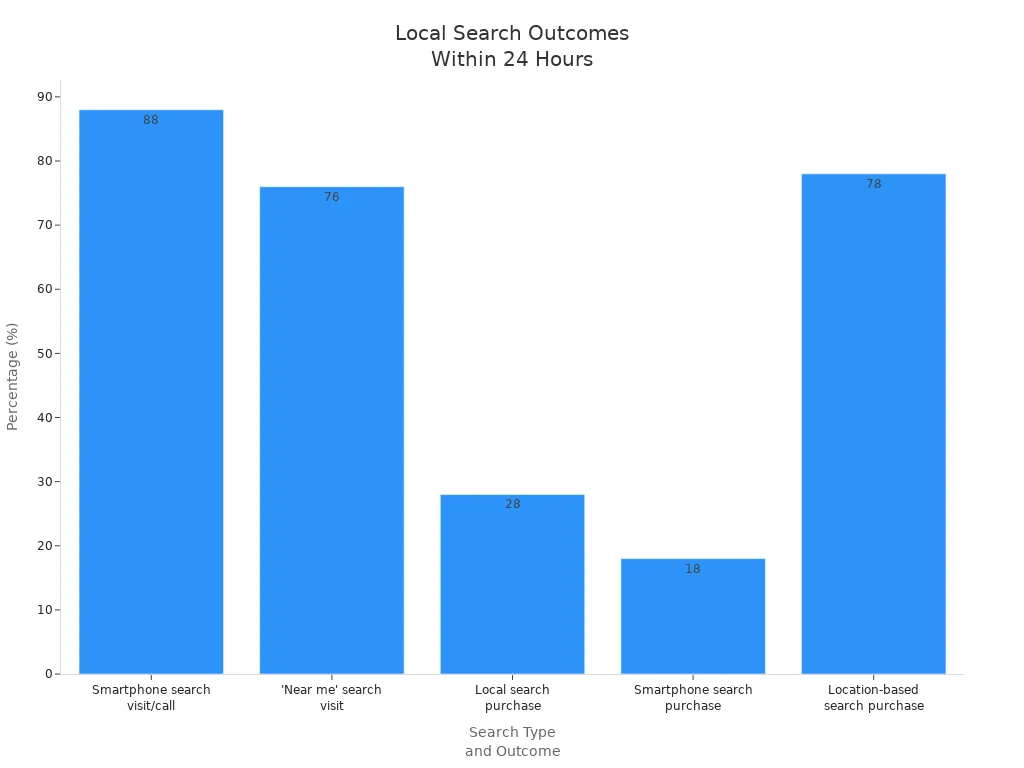Top Local SEO Audit Tools to Boost Client Results

Have you ever wondered how much local search can drive real business?

When you get local SEO right, you put your business in front of people who are ready to visit or buy—sometimes within just 24 hours. Many businesses struggle with incomplete Google Business Profiles, inconsistent information, and weak local SEO strategies. These challenges can keep you from showing up in the right local search results. Using the right Local SEO Audit tools helps you spot these problems and fix them fast. You gain clear steps to boost your local SEO and connect with more local customers.
Local SEO Audit Overview

Why Local SEO Matters
You want your business to show up when people search for something nearby. Local SEO helps you do just that. When you focus on local SEO, you reach customers who are ready to visit or buy. Did you know that 76% of people who search on their smartphones for something nearby visit a business within a day? Even better, 28% of those local searches lead to a purchase. Local SEO puts your business in front of people who are ready to act.
Let’s look at how local SEO compares to traditional SEO:
| Aspect | Local SEO | Traditional SEO |
|---|---|---|
| Target Audience | Focuses on a specific geographical area (city, neighborhood) | Targets national or international audiences without geographical limits |
| Keywords and Content | Uses location-specific keywords and locally relevant content | Uses industry-specific or broad topic-related keywords |
| Business Listings | Emphasizes Google Business Profile and local platforms | Focuses mainly on the website and broader listings |
| Reviews and Ratings | Prioritizes collecting and managing local customer reviews | Less critical, focuses on content quality, backlinks, and user experience |
| Link Building | Focuses on local and industry-specific backlinks | Focuses on diverse, authoritative backlinks from relevant websites |
You can see that local SEO gives you an edge by targeting people nearby. It boosts your local visibility and helps you climb the local rankings in local search results.
Tip: Optimizing your Google Business Profile, building local citations, and encouraging reviews can quickly improve your local search results.
Audit Process Steps
A local SEO audit helps you find what’s working and what needs fixing. Here’s how you can run a local SEO audit step by step:
- Check for Google penalties. Make sure your site is not being penalized, as this can hurt your rankings.
- Do local keyword research. Find out what people in your area are searching for.
- Analyze your current rankings. See where you stand in local search results.
- Review your links and website authority. Strong backlinks help boost your rankings.
- Audit your citations. Make sure your business info is correct and matches across all sites.
- Monitor brand mentions. See who is talking about your business online.
- Evaluate your Google Business Profile. Fill out every section and keep it updated.
- Assess your reviews and ratings. Respond to reviews and aim for high ratings.
- Review your social media presence. Stay active to support your local SEO.
You can use a spreadsheet to track your findings during your local SEO audits. This makes it easy to spot trends and take action.
Choosing Local SEO Audit Tools
Key Features
When you pick a tool for local SEO, you want it to make your job easier. The right tool helps you spot problems and fix them fast. Look for features that help with local SEO optimization, like checking your Google Business Profile. This profile lets you manage your business on Google, respond to reviews, and share updates. You need a tool that keeps your business information accurate everywhere online. This means your name, address, and phone number (NAP) must match on every site.
Here are some features you should look for:
- Audit automation for quick checks and reports
- Competitor analysis to see how you stack up in local SEO
- Review management so you can reply to customers and boost your reputation
- Citation tracking to keep your business info consistent
- Google Business Profile integration for easy updates
- Site crawling to find broken links or duplicate content
- Keyword research to find what people search for in your area
Many small businesses start with free tools like Google Business Profile and Google Search Console. These cover the basics of local SEO. When your business grows or you manage many locations, you might need advanced tools for deeper audits and local search optimization.
Tip: If you have legacy citation issues or run several locations, look for tools that offer citation cleanup and centralized listing management.
Pricing Factors
Pricing for local SEO audit tools can vary a lot. Some tools charge a one-time fee for a single audit. Others use monthly plans, which work well if you want ongoing optimization. Freelancers often charge between $300 and $1,500 for basic audits. Agencies may start at $1,500 and go up to $5,000 or more for full-service local SEO.
You might see packages like Basic, Growth, or Dominator. Basic plans cover core Google Business Profile optimization and simple citation building. Growth plans add more features, like advanced citations and review strategies. Dominator plans include everything, plus local landing page optimization and competitor analysis.
Some tools let you pay by the hour, while others offer retainer-based pricing for ongoing support. Always check for hidden costs, like extra fees for technical fixes or content updates. Pick a plan that matches your business size and local SEO needs.
Top Local SEO Audit Tools

BrightLocal
BrightLocal stands out if you want a tool built just for local SEO. You can track your map and organic rankings separately, which gives you a clear view of how your business shows up in local search. The platform pulls in insights from local directories, so you get a deeper look at your local presence. You can manage reviews from many sites in one place, reply to customers, and even get prompts to ask for more reviews. BrightLocal also lets you compare your business to local competitors by looking at keywords, citations, reviews, and even photo counts.
Some unique features include:
- Multi-location tracking and area-based visibility
- Local SEO audits that flag issues like NAP mismatches and duplicate listings
- Google Business Profile management with 18 months of data, post publishing, and spam removal tools
- White-label dashboards and reports for agencies
BrightLocal charges a low fee per site, with no recurring costs for citation building. You get permanent data ownership and support for over 1,000 sites. This tool works best for agencies, multi-location businesses, or anyone who wants a specialized local SEO audit tool.
Tip: If you manage several locations, BrightLocal makes it easy to keep everything organized and spot problems fast.
Whitespark
Whitespark helps you find and fix citation issues, which are key for local SEO. The Local Citation Finder scans directories and local listing sites to show where your business appears and where you have gaps. You can compare your citations to top competitors and see where you need to improve. Whitespark also checks that your business info matches everywhere, which builds trust with search engines and customers.
Key features:
- Finds citation opportunities across directories, review sites, and local listings
- Manual citation building service for businesses short on time
- Competitor citation analysis to spot new opportunities
- Prioritizes the most impactful citations to boost your local search rankings
Whitespark is a premium service, and pricing is not always clear. It costs more for done-for-you services, and it does not offer a full dashboard like some competitors. Whitespark works well if you want to focus on citation building and analysis to improve your local SEO.
Moz Local
Moz Local makes managing multiple locations simple. You can control all your business listings from one dashboard, which saves time and reduces mistakes. Moz Local keeps your business name, address, and phone number consistent across platforms. This helps your local SEO and builds customer trust. The tool also follows Google’s rules for naming, which is important for multi-location or multi-practitioner businesses.
Main benefits:
- Centralizes management for all locations
- Ensures consistent business info everywhere
- Supports compliance with Google’s guidelines
- Improves search rankings and customer trust
Moz Local offers affordable plans, especially for businesses with many locations. It is a great choice if you want to keep your listings accurate and boost your local SEO without a lot of manual work.
SEMrush Local
SEMrush Local gives you a full set of tools for local SEO audits. You can track your local keyword rankings, check your site for technical issues, and manage your business info on directories like Google Business Profile, Yelp, and Bing Places. The platform also helps you find local citation opportunities and analyze competitor backlinks. You get suggestions for local keyword placement and content optimization.
Key features:
- Position Tracking for local keywords
- Site Audit for technical SEO issues
- Listing Management for accurate business info
- Backlink Analytics and Gap tools for local link building
- On-Page SEO Checker for local content tips
- Automated alerts and detailed reports
SEMrush Local starts at $20 per location per month for the Basic plan, which covers directory management and reputation monitoring. The Premium plan is $40 per location per month and adds features like AI-generated review replies and Google Maps ranking tracking. SEMrush Local is best if you want to combine local SEO with broader SEO strategies.
Yext
Yext helps you keep your business info accurate across hundreds of sites. You can update your details in one place, and Yext pushes those changes everywhere, including Google Business Profile, Apple, and even Alexa. The platform uses AI to spot errors and remove duplicate listings. You can track how many people see your business, click to call, or ask for directions.
Yext also brings all your reviews into one dashboard. You can reply to reviews, use AI to suggest responses, and see trends in customer feedback. This helps you improve your reputation and climb higher in local search results.
Key features:
- Centralized updates for business info
- Automated error detection and duplicate suppression
- Review management with AI-suggested replies
- Sentiment analysis and competitive benchmarking
Yext is a subscription service and can be costly, but it is powerful for businesses that want to manage listings and reputation at scale.
GMB Everywhere
GMB Everywhere is a Chrome extension that gives you quick insights right inside Google Maps and Search. You can see competitor rankings, check their profiles, and get keyword suggestions for your own SEO. The tool offers basic audit features to check your Google Business Profile health and compliance.
| Aspect | GMB Everywhere Characteristics | Comparison to Other Tools |
|---|---|---|
| Integration | Chrome extension, works in Google Maps/Search | More lightweight, embedded in Google |
| Competitor Analysis | View competitor rankings and profiles | Focused on competitor insights |
| SEO Features | Keyword suggestions | Basic SEO tools |
| Audit Features | Basic audit tools for profile health | Less comprehensive than full platforms |
| Automation | Manual, no automated posting or review handling | Other tools may automate more |
| Pricing | Free and Pro versions | Budget-friendly |
| Ideal Users | Budget-conscious, quick competitor analysis | More advanced tools for power users |
GMB Everywhere is perfect if you want fast, free insights or if you are learning the basics of local SEO.
Localo
Localo is built by local SEO experts to make audits and optimization easy. You can monitor and improve your Google Business Profile and local rankings across many locations. The platform gives you actionable recommendations, tracks your rankings, and checks your citations. You can also monitor reviews and analyze competitors.
Main features:
- Google Business Profile audit tool with step-by-step recommendations
- Local rank tracking with color-coded maps
- Citation tracking and directory suggestions
- Review monitoring and sentiment analysis
- Competitor analysis and prioritized task lists
Localo automates much of the audit process, saving you time. It is great for agencies or businesses that want to manage multiple locations and need clear, actionable steps to improve local SEO.
Search Atlas
Search Atlas helps you dig deep into competitor analysis for local SEO. You can research competitors’ traffic, authority, backlinks, keywords, and even their ads. The Local SEO Heatmap shows how your rankings compare to others within a four-mile radius. You can set up alerts for competitor mentions and track their review patterns.
Key features:
- Competitor research for traffic, backlinks, and keywords
- Local SEO Heatmap for visualizing rankings
- Google Maps ranking checker
- Alerts for competitor activity and review acquisition
- Integrated dashboard for content, technical, and competitor analysis
Search Atlas is ideal if you want to find ranking opportunities and learn what top competitors are doing in your area.
Birdeye
Birdeye focuses on review management to boost your local SEO. You can automate review requests through SMS and email, making it easy to collect more feedback. The dashboard lets you track reviews from over 150 platforms, spot fake or negative feedback, and highlight positive reviews for marketing. Birdeye uses AI to draft quick, personalized replies and shares positive reviews on your website and social media.
Key features:
- Automated review requests and responses
- Centralized review monitoring from 150+ platforms
- AI-driven sentiment analysis and competitor benchmarking
- Consolidated customer communication across SMS, social, and web chat
Birdeye works well for businesses that want to improve their online reputation, increase review volume, and climb higher in rankings.
SEOptimer
SEOptimer is a budget-friendly tool for local SEO audits. You can run unlimited audits, export PDF reports, and use the SEO crawl tool for on-page checks and page speed insights. The free plan gives you basic audits, while the DIY SEO plan at $29 per month unlocks unlimited audits and more features.
| Pricing Tier | Price (per month) | Included Features |
|---|---|---|
| Free Plan | Free (limited) | Basic audits, meta tag and keyword generators, sitemap and robots.txt tools |
| DIY SEO | $29 | Unlimited audits, exportable PDF reports, full SEO crawl, on-page checks, speed |
SEOptimer is best for small businesses or agencies that want simple, affordable local SEO audit tools.
GMB Audit Chrome Extension
The GMB Audit Chrome Extension makes Google Business Profile audits fast and easy. It works right inside Google Search and Maps, showing you business categories, review counts, star ratings, and photo uploads. You can export all this data into a CSV file for deeper analysis. The extension also checks review velocity and photo upload frequency, helping you spot trends.
Main benefits:
- Instant insights inside Google Search and Maps
- Audits reviews, photos, and business categories
- Exports business data for further analysis
- Free to install and use
This extension is perfect if you want to save time and get detailed data during your local SEO audit.
Maximizing Local SEO Results
Combining Tools
You get the best results from local SEO when you use more than one tool. Each tool has its own strengths. For example, some focus on backlink quality, while others check citation consistency or track keyword rankings. When you combine tools, you cover all the important parts of local SEO. Google’s free tools, like Google Analytics and Search Console, give you real data about how customers find your business and what keywords work best. Citation tools such as Moz Local help you spot and fix inconsistent business listings, which saves you time and builds trust with search engines.
Here’s why using multiple tools makes sense:
- You see a full picture of your local SEO health.
- You catch issues that one tool might miss.
- You speed up the audit process and get more actionable insights.
- You can benchmark your business against competitors from different angles.
Tip: Try pairing a core platform with a specialized tool. For example, use SEMrush for keyword tracking and Birdeye for review management. This way, you get both broad and deep insights for local search optimization.
Actionable Insights
Once you finish your local SEO audit, you need to turn those findings into real improvements. Start by looking for patterns in your results. Do you see the same problems popping up, like missing citations or weak reviews? Find out why these issues keep happening. Maybe your team needs better training, or your business info is outdated.
Follow these steps to make your audit work for you:
- List the most urgent problems first. Focus on fixes that will have the biggest impact.
- Set clear goals for each improvement. Make sure they are specific and easy to measure.
- Take action—update your Google Business Profile, fix NAP details, and ask for more reviews.
- Track your progress. Use charts or tables to see what’s working.
- Share your results with your team and keep everyone in the loop.
Note: Using visuals like tables or graphs helps everyone understand your progress and keeps your local SEO strategy on track.
When you use these steps, you turn audit data into real growth. Your business climbs higher in local rankings, and you connect with more local customers. That’s the power of smart local SEO optimization.
You have plenty of great local SEO audit tools to choose from.
- Tools like Whitespark and Moz Local help you manage citations and reviews.
- Platforms such as GeoRanker and Local Falcon offer geo-specific rank tracking and competitor insights.
- Free trials let you test features and see if a tool fits your workflow before you commit.
Pick a tool that matches your business size, budget, and goals. When you start auditing and optimizing, you boost your local search visibility and drive more customers to your door. Local SEO audits can turn small changes into big growth! 🚀
FAQ
What is a local SEO audit tool?
A local SEO audit tool checks your online business presence. It finds problems with your listings, reviews, and rankings. You get clear steps to fix issues and improve your spot in local search results.
How often should you run a local SEO audit?
You should run a local SEO audit every few months. If you change your business info or open new locations, check more often. Regular audits help you catch mistakes before they hurt your rankings.
Can you use free tools for local SEO audits?
Yes! Free tools like Google Business Profile and Google Search Console give you basic insights. You can start with these. If you want deeper analysis or manage many locations, try paid tools for more features.
What is the most important feature in a local SEO audit tool?
Look for tools that check your business info across all sites. Consistent name, address, and phone number (NAP) details help you rank higher and build trust with customers.
See Also
The Key Business Advantages Of Conducting SEO Audits
How To Use SEO Writing Tools To Boost Rankings
Step-By-Step SEO Audit Guide To Improve Your Website

